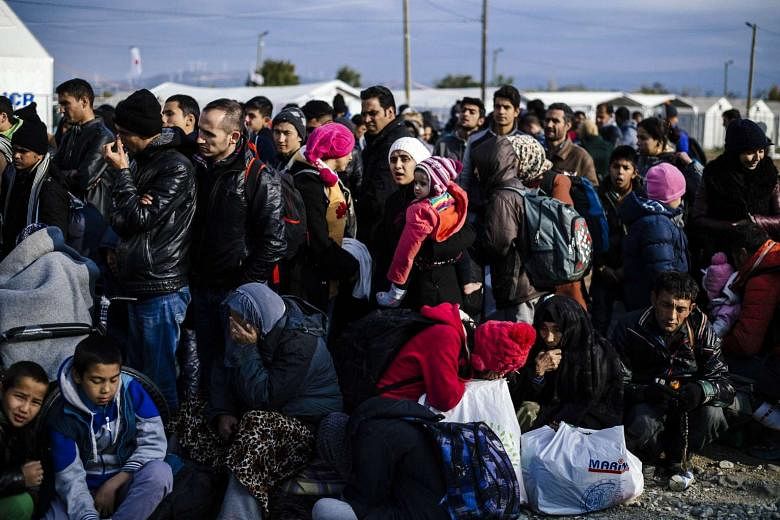BERLIN • For months, hundreds of thousands of men, women and children have literally marched their way into Europe, fleeing war, poverty and hunger, arriving in such huge numbers that they set off uncommon displays of compassion - and outright acts of fear.
Even before the Paris attacks last Friday, some of the most welcoming Europeans were beginning to lose patience. Borders were closed, benefits cut, and warnings issued in Arabic to stay away.
But last Saturday, French officials revealed what could prove to be a turning point in the debate over migration: One of the attackers was carrying a Syrian passport, and perhaps more ominously, may have entered Europe along the migrant trail.
Poland moved first to shut the door. "After Paris, we lost security guarantees... The tragic events in Paris showed weakness in Europe," said Mr Konrad Szymanski, Poland's new minister for relations with other European nations.
Europe never knew how to deal with the migrants. Greece pushed them to Macedonia. Hungary put up a fence. Austria and Germany welcomed them, for a time. But there was no coordinated strategy for the 28 members of the European Union. The only agreement, after summit meetings and other talks, was a plan to distribute 160,000 refugees among all the member states.
Now, Poland is moving towards undoing that deal. Under the plan, the country would receive only 9,000 migrants, but Mr Szymanski said Poland would agree to accept them only with "security guarantees", including a full security check on "every person covered by international protection in Europe".
Poland's determination to scuttle the pact may spread, dooming it even as investigators in Paris are still trying to establish the identities of the assailants behind last Friday's attacks. It was too soon to say for certain whether they had links to the refugees from the Syrian conflict, but investigators believe that militants have tried to hide among the masses legitimately seeking asylum.
A French intelligence official said it would not be the first time that a militant had mingled in the stream of migrants arriving in Europe via Turkey and Greece. He said French security services had recently identified one in Calais.
The attacks emboldened some politicians who had already voiced fears about the security risks and financial costs of trying to accommodate hundreds of thousands of people. Conservative politicians from Slovakia and populist and nationalist leaders in Western Europe swiftly used denunciations of the Paris violence to bolster their calls for keeping migrants out.
German Chancellor Angela Merkel found herself increasingly isolated at home and around Europe over her call for protecting refugees fleeing war, poverty and terrorism. In an unusually emotional appearance last Saturday, she notably did not change her stance. "We know that our life of freedom is stronger than terror," Dr Merkel said. "Let us answer the terrorists by living our values with courage."
But even she could not ignore the potential security threat. She too huddled last Saturday with her top security officials. German Interior Minister Thomas de Maiziere, who has been at odds with Dr Merkel over curbing the refugee flow, announced tighter monitoring of rail and air links with France.
He said the police would be watching known sympathisers with not only extreme Islamist groups but also right-wing groups. Germany has recorded more than 500 attacks on shelters for migrants this year.
NEW YORK TIMES

